In our modern lives, smartphones have become indispensable companions, seamlessly integrating into our daily routines. The advent of internet services has undeniably transformed how we communicate, extending its influence to even the realm of healthcare with the introduction of doctor appointment booking apps.
The remarkable potential offered by smartphones has revolutionized the concept of communication. Traditional methods involving phone calls and waiting rooms prove to be frustrating experiences for many. Thankfully, online doctor appointments have emerged as a valuable solution, catering to introverts and those leading hectic lives who find it inconvenient to engage in lengthy phone calls and endure prolonged waiting times.
Now, let us delve into the business realm and explore the possibilities of entering this niche by developing a sophisticated doctor appointment app.
The Ever-Evolving Market
The ever-expanding industry for mobile health applications keeps showing off its incredible potential, with a stunning USD 43.5 billion expected to be generated worldwide in 2022. Based on experts who predict a promising future, the market is expected to grow from 2023 through 2030 at a median CAGR of 11.6%. The growing number of fitness and health programs, which are helpful tools for obtaining and monitoring users’ health-related data, can be credited with this exponential growth.
Furthermore, there is a growing awareness among individuals about the importance of maintaining physical health and improving their lifestyles, further fueling the adoption of these apps.
As per the insights shared by Research and Markets, the global medical scheduling market is assured to reach a remarkable value of US $789.56 Mn by 2027. This projection reflects a promising CAGR of 13%, indicative of a rapidly expanding market with immense opportunities.
What is a Doctor’s Appointment App?
A doctor’s appointment app is a user-friendly digital tool that simplifies the task of scheduling and organizing medical appointments. It offers patients a convenient and effective way to book appointments directly from their smartphones or other internet-connected devices with healthcare professionals.
These apps typically come equipped with various features, including real-time updates on doctor availability, specialized search filters, helpful appointment reminders, and the flexibility to manage and reschedule appointments as needed. By eliminating the necessity for traditional methods like phone calls or in-person visits, these apps strive to enhance accessibility and elevate the overall patient experience within healthcare.
Why Do Doctors Need an Excellent Appointment Booking App?
The rise in smartphone usage has led to an increase in mobile apps catering to various daily tasks, including booking services and managing finances. Nowadays, people rely on their smartphones to conveniently schedule doctor’s appointments and address their health and wellness requirements, avoiding the hassle of long waiting queues. To cater to this growing demand, healthcare providers are developing mobile apps with advanced features like e-prescriptions, remote tracking, and online appointment booking.
Many patients now prefer the convenience of online booking of health appointments, and both healthcare professionals and patients acknowledge the advantages of digital appointment booking platforms. These online doctor appointment apps have become essential for selecting medical services, offering convenience, and ensuring high-quality care. With the ongoing post-COVID era, the popularity of these apps is anticipated to continue rising as more individuals embrace the benefits of digital healthcare solutions.
Features of Doctor Appointment Booking App.
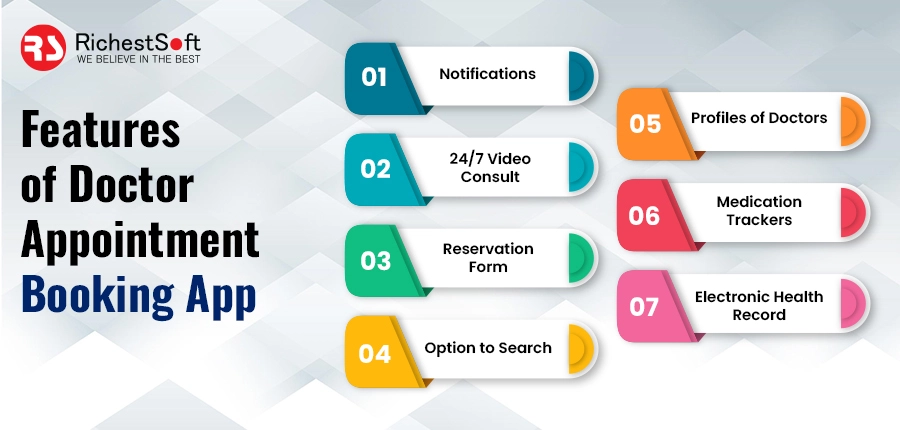
Important Features:
Notifications are important.
- Incorporating alerts and notifications to reduce unused time slots and minimize missed appointments.
- Reminders and confirmations help patients stay organized and ensure timely in-office visits.
24/7 Video Consult:
- A necessary feature for medical appointment apps, enabling immediate video consultations between patients and doctors.
- This feature accommodates urgent health concerns and eliminates the need to wait for in-person visits.
Reservation Form:
- Simplifying the appointment booking process by providing an intuitive reservation form.
- Patients should be able to select preferred appointment times and dates with ease.
Option to Search:
- Including a search function facilitates easy navigation through a large-scale database of doctors and clinics.
- Patients can filter their search based on preferred treatments, ratings, location, and other relevant factors.
Profiles of Doctors:
- Doctor profiles should be concise and comprehensive, including images, key competencies, experience, and pricing information.
- Detailed profiles help patients make informed decisions about their healthcare provider.
Medication Trackers:
- Patients should have the ability to track their prescribed medications through the app.
- Medication tracking promotes adherence to treatment plans and helps patients manage their healthcare effectively.
EHR (Electronic Health Record) Systems:
- Integrating EHR systems into the app allows doctors to access patient medical records online, ensuring safer prescriptions and increasing productivity.
- EHR integration enhances the overall efficiency and accuracy of healthcare services.
Benefits of Healthcare Appointment Booking App
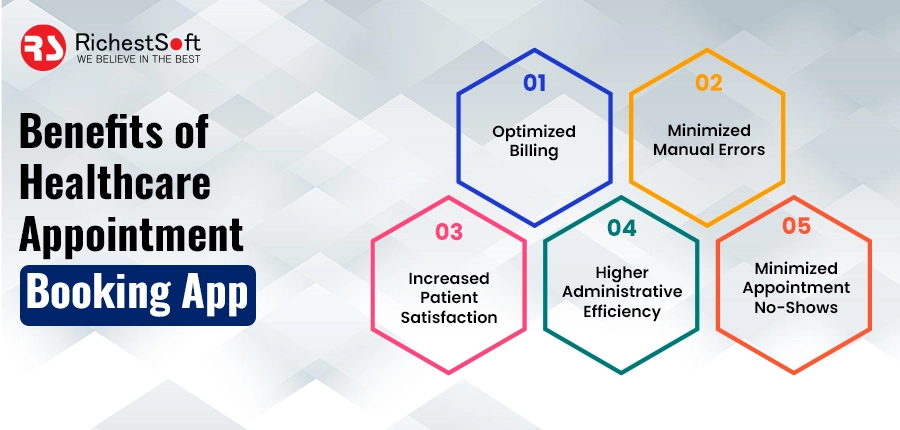
Thanks to a healthcare appointment booking app, patients may quickly select their favorite expert and arrange their healthcare facility visit online. Developing a doctor appointment booking app requires significant time, effort, and investment but offers substantial benefits to doctors, patients, and front desk workers.
Optimized billing:
- Doctor appointment apps automate billing processes, allowing hospitals to issue bills through the app.
- Patients can conveniently make payments through built-in payment gateways.
- Billing history is accessible for review and checking at any time.
Minimized manual errors:
- When managing patient and payment information, front desk staff are vulnerable to human mistakes.
- Doctor appointment apps automate processes and reduce the risk of errors.
- Manual errors and duplicate records are minimized, avoiding potential financial losses.
Increased patient satisfaction:
- 43% of patients prefer scheduling appointments online.
- 57% of consumers search online for healthcare providers.
- Younger generations appreciate the convenience of digital communication with hospitals.
- Busy individuals value the time-saving capabilities of medical apps.
Higher administrative efficiency
- 60% of respondents prefer booking appointments online, avoiding time wasted on phone calls.
- 42% of respondents find being put on hold during phone calls a significant time waster.
- 17% of respondents need help to book appointments during non-working hours in hospitals.
- Medical appointment software reduces appointment booking time and minimizes front desk workload.
Minimized appointment no-shows:
- The US healthcare system loses $150 billion annually due to patient no-shows.
- Doctor appointment apps send automatic reminders to patients, reducing no-shows.
- Patients can reschedule appointments at their convenience.
A Step By Step Process of Creating a Doctor Appointment App.
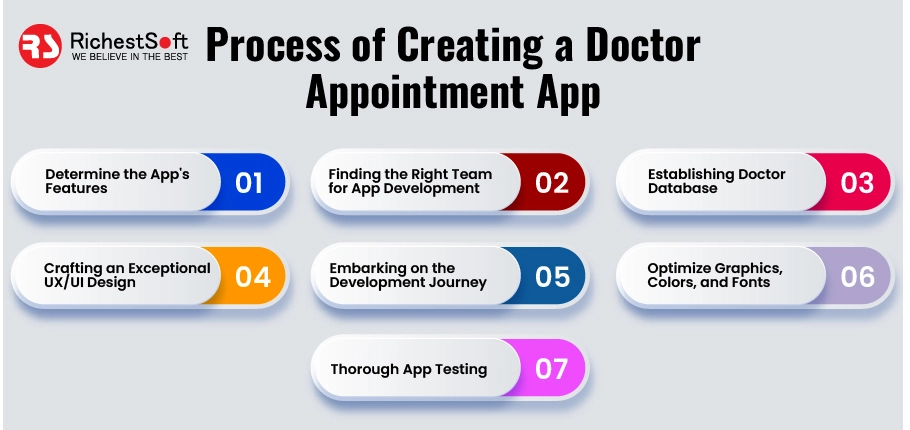
Determine the App’s Desired Features
Before searching for a skilled developer or reputable company to assist in creating your appointment app, carefully consider the features you intend to incorporate. A comprehensive assessment of desired functionalities will help shape the app’s capabilities and enhance its effectiveness.
Consider including the following features:
Doctor Profiles and Information
- Give people access to a complete directory of your doctors, complete with biographies, a list of the services they provide, and contact information.
- Give people useful information so they may choose their healthcare providers wisely.
Appointment Reminders
- Offer patients the convenience of signing up for text or email reminders, ensuring they are well-informed about upcoming appointments.
- Optimize patient engagement and reduce the likelihood of missed appointments.
Integration with Third-Party Platforms
- Explore integrating the app with external platforms, such as online booking websites, to streamline the appointment scheduling process.
- Enhance the user experience by facilitating seamless appointment booking and management.
E-Prescription Capability.
- Consider incorporating e-prescription app development to mitigate the risks associated with incorrect prescriptions.
- Improve patient safety and eliminate manual errors in prescription processes.
Finding the Right Team for Online Doctor Appointment System Development.
It is crucial to assemble the best team possible for the job if you want your web-based doctor appointment system to succeed successfully. Consider the following variables while making your decision:
Consider the following variables while Hiring a Team of App Development
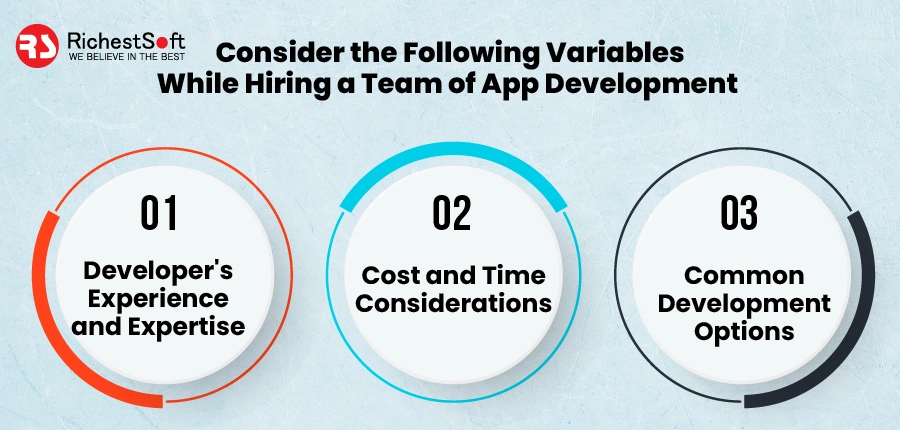
Developer’s Experience and Expertise:
- Look for app developers with relevant experience in building healthcare-related applications.
- Consider their track record and portfolio to assess their capabilities in delivering high-quality solutions.
Cost and Time Considerations:
- Evaluate the cost of services offered by different developers.
- Consider the estimated time needed to complete your project and align it with your timeline.
Common Development Options:
In-house Team:
- Consider forming a dedicated team within your company.
- This team would work in-house and be salaried employees.
Software Outsourcing Vendor:
- Engage a specialized doctor appointment app development company on a project basis.
- Compare services and costs, considering both local and overseas options.
- Prioritize vendors with competitive pricing, high-quality products, and a proven track record.
Tech Partnerships:
Collaborate with a tech partner who will fully own the app development process.
This partner should provide expertise and deliver comprehensive development services.
Investing in the expertise of an outsourcing vendor, even if you have an in-house team, can be a valuable decision.
Establishing a Comprehensive Doctor Database.
For a seamless user experience, your app should provide access to doctor-related information. There are a couple of viable methods to do this:
Integration with External Doctor Databases:
- Use their respective APIs to utilize established doctor databases such as 1upHealth, Doctor.com, BetterDoctor, or Doctor Database.
- Leverage the available data from these sources to provide users with comprehensive doctor information.
Building a Custom Database:
- Alternatively, you can develop a custom solution by compiling a database of professionals from various healthcare organizations.
- This approach is suitable if you create a specialized app for a specific clinic or healthcare chain.
- Ensure your software development team has expertise in handling sensitive health data and building secure databases.
Crafting an Exceptional UX/UI Design
When focusing on your app’s UI/UI design, it’s crucial to consider the distinct requirements of each user group. Paying attention to their specific needs will enhance their experience and satisfaction:
Patient Portal Design:
- Ensure the patient portal design is intuitive and user-friendly.
- Streamline the appointment booking process, making it effortless for patients to navigate and schedule their appointments.
- Emphasize clear communication of medical information, allowing patients to access their health records easily.
Doctors’ Portal Design:
- Prioritize the accessibility of Electronic Health Record (EHR) information in the doctors’ portal.
- Present up-to-date and relevant patient data, enabling doctors to access critical information promptly.
- Implement a user-friendly interface that enhances efficiency and facilitates seamless communication between healthcare providers.
Front Desk Employee Experience:
- Tailor the app design to cater to the needs of front desk employees who handle administrative tasks.
- Ensure the app simplifies administrative information management, reducing workload and increasing productivity.
Embarking on the Development Journey.
There are several crucial factors to take into account as the development phase progresses to build a reliable and user-friendly app:

Increase both at the front and back ends:
- Engage your development team in building the front-end interfaces and designing a seamless user experience.
- Simultaneously, develop the back-end architecture to ensure smooth functionality and efficient data management.
- Integrate doctor databases, enabling users to access comprehensive and up-to-date information.
In-App Communication and Notifications:
- Implement secure in-app message exchange solutions, facilitating seamless communication between patients and healthcare providers.
- Enable push notifications to deliver timely updates, appointment reminders, and other relevant information.
Payment Processing:
Establish a secure and reliable payment processing system within the app, ensuring seamless transactions for services rendered.
Ensuring HIPAA Compliance.
Securing patient information requires strict observation of the health care portability and Accountability Agreement (HIPAA). Work with your IT staff to ensure your app complies with healthcare regulatory compliance guidelines. It will help maintain the confidentiality and security of patient data while avoiding potential penalties and unauthorized access.
Continuous Improvement through User Feedback.
It is essential to prioritize user feedback to stay ahead of the competition and meet the evolving needs of patients and medical staff. Regularly update and enhance your app based on their valuable input, ensuring it remains relevant, user-friendly, and aligned with their expectations.
We invite you to explore our recent post on building medical insurance verification software for further insights into healthcare-related software development.
By carefully considering these factors and actively seeking user feedback, you can develop an app that offers a secure, user-friendly experience and remains adaptable to the ever-changing healthcare landscape.
Optimize Graphics, Colors, and Fonts
During the user interface development phase, careful consideration should be given to selecting appropriate graphic elements. Creating a visually appealing and user-friendly medical appointment booking system involves adopting a simple layout and a minimalist style. Work closely with your design team to choose color palettes that evoke warmth and tranquility, creating a soothing user experience. Similarly, prioritize user-friendly typography that enables users to distinguish and access the desired information without any hassle easily.
Thorough App Testing
To make sure, your appointment app’s seamless functionality and optimal user experience, thorough testing is indispensable. This stage involves allowing patients and healthcare providers to trial the app, enabling you to assess the simplicity and effectiveness of your minimum viable product (MVP). Collecting feedback from users and healthcare professionals to enhance their future experiences with the app is invaluable.
Testing encompasses more than just usability. It is vital to evaluate the stability and security of your software by simulating demanding load situations and real-world events. This rigorous testing ensures that your app can withstand the challenges of the healthcare environment, providing a reliable and secure platform for users.
By meticulously fine-tuning the visual elements and conducting comprehensive testing, you can create an aesthetically pleasing and highly functional doctor appointment app that meets the needs of both patients and healthcare providers.
What is the Price of Developing a Doctor Appointment App?
The cost of developing a doctor appointment app can vary depending on the desired features and complexity. For a minimum viable product (MVP), the cost can start at around $54,000, while a fully functional solution with mobile apps and a web dashboard can range up to approximately $84,000.
Factors Affecting the Cost of Doctor Appointment App:

Development Platform:
The development platform choice—iOS, Android, web apps, or cross-platform apps—also influences the cost. Each platform has different development requirements and associated costs.
App Complexity:
The complexity of the app and the features included significantly impact the development cost. The fundamental apps without advanced functionalities will generally be more affordable. However, incorporating features like video consultation, appointment management, and electronic health record management will increase the overall app development cost.
Integration with Third-Party Tools:
Integrating the doctor appointment app with third-party tools like Electronic Health Records (EHRs), payment options, SMS gateways, and other external systems can increase development costs.
FAQs
Q1: How can I pick a business that creates unique applications?
Ans: Ask questions about the business during your initial phone contact with a possible custom application development firm, and then decide which one best suits your needs based on the firm’s specifications, operational style, years of expertise in your sector, and recent, observable successes with other businesses.
Q2: What is the time frame for developing a custom application?
Ans: The breadth, depth of characteristics, the number of connections, and other elements may determine how long a piece of software takes to build. However, the typical time for developing bespoke software is four to 12 months.
Q3: Why are the solutions for custom app creation superior to those for pre-made apps?
Ans: By offering the following benefits, customized app creation enables you to manage your company more successfully than already made ones:
- It takes into account your particular needs.
- It increases ROI and Team Collaboration.
- It also enhances productivity and customer involvement.
- It also offers Complete customizability.
- It gives Greater Security.
- It provides flexibility and high profitability.
- Moreover, it also offers automatic workflow with Lots of Features.
Q4: What are the key features to include in a doctor appointment app?
Ans: A comprehensive doctor appointment app should encompass doctor profiles, online booking, EHR integration, video consultations, patient reviews, medication tracking, and notifications.
Q5: How can I ensure the utmost security and privacy of patient information in my app?
Ans: To prioritize security and privacy, adhere to HIPAA compliance, employ robust data encryption, implement secure authentication methods, regularly update the app with security patches, and conduct thorough penetration testing.
Q6: How can I enhance user-friendliness for patients and healthcare providers in the app?
Ans: Optimize user experience through intuitive navigation, concise information display, seamless appointment scheduling, easy access to medical records, smooth communication channels, personalized notifications, and visually appealing interfaces.
Q7: What development approach should I consider for building a doctor appointment app?
Ans: Choose from options like an in-house development team, outsourcing to a specialized healthcare software company, or forming a tech partnership. When selecting your approach, evaluate expertise, cost-effectiveness, timeline, and the ability to handle sensitive health data.
Q8: How can I ensure a seamless user experience for patients using the doctor appointment app?
Ans: To provide a seamless user experience, optimize app performance, minimize loading times, simplify the registration and appointment booking process, offer personalized recommendations, and incorporate user-friendly interfaces and intuitive navigation.
Q9: What measures can I take to encourage the widespread adoption of my doctor appointment app?
Ans: To promote widespread adoption, consider implementing referral programs, offering incentives or rewards for app usage, conducting targeted marketing campaigns, collaborating with healthcare providers and clinics for app promotion, and actively seeking feedback from users to improve the app’s features and functionalities continuously.
Conclusion
Using a mobile app for doctor’s appointments offers numerous benefits to patients, healthcare professionals, and workplaces. Instead of adapting to pre-existing solutions, consider contacting a specialized doctor appointment app development company to create a customized app tailored specifically for your medical practice.
Imagine the convenience and security of empowering your patients to schedule appointments and access medical services at their fingertips.
Investing in doctor booking app development can unlock these advantages and more. Select the features that will captivate your target audience, acknowledging the increasing demand for self-directed care, online appointment booking, easy access to medical information, and telemedicine options.
With such a program in place, you can effectively cater to their needs while accomplishing your essential objectives. To ensure the best results and expert guidance, consider hiring a reputable Android app development company from the market.

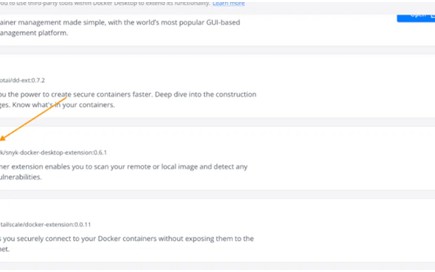




Leave a Reply